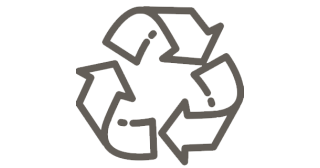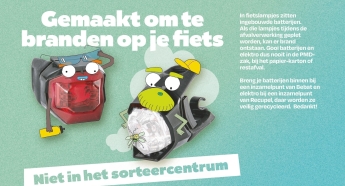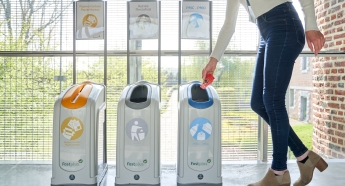At the office
Sorting PMD at work is totally logical. Because we all do it at home. What’s more, it's sustainable and required by law. But how best do you go about it? And how do you make sure that everyone is on board?
1. Analyse your situation
- Which waste flows occur most frequently and in which locations?elke afvalstromen komen het meest voor en op welke locaties?
- What quantities are involved?
- Where are rubbish bins located at the moment (indoors and outdoors)?
- Besides the employees, are there any other specific target groups (non-native speakers or children) who need a modified approach to communication?
- Where is the waste collected and which collection containers are provided?
- What is the role of the cleaning team and how are the contents of the rubbish bins taken to the central collection point?
2. Choose the right rubbish bins and position them shrewdly
- Put rubbish bins where people eat, drink or often pass by.
- Gear the size to the expected volume and avoid overflowing bins.
- Group the rubbish bins for the various materials – PMD, and residual waste, and possibly paper-cardboard and organic waste – together in sorting islands.
- Provide a collection point with large containers per type of waste.
Download the rubbish bins plan for offices
All you need to know about the choice and location of your rubbish bins
3. Bring in a professional waste partner
As a company or an organisation, you call upon a professional partner to collect and process your waste. You can add PMD to your current contract with your waste partner, but you can, of course, also opt for another waste partner.
Check whether your waste partner is affiliated to Fost Plus. That way, you can be sure that your PMD follows the proper path to recycling. These collectors can also provide you with the official PMD bags, bearing the words ‘PMD-Companies’. The official bags are also distributed by a number of cleaning companies.
Consult the list of affiliated PMD waste collectors
View our checklist for requesting a quote
Do you only have a limited quantity of PMD, comparable to an average family? Then can you call in Flanders and Wallonia upon the municipal door-to-door collection system for your PMD. In that case, you use the municipal blue bags that you can buy in your local stores.
1. Inform
Keep colleagues, customers and visitors informed
Make sure everyone knows that they have to sort their waste and explain exactly how to do that. Use every possible channel and means for this: posters, e-mail, internal newsletters, social media, etc. Staff meetings can be an ideal opportunity to raise the sorting issue. Involve your colleagues too – or the CSR manager – and bring them in as sorting ambassador(s).
Make sure that the sorting rules are clear to visitors, customers and suppliers. The Sortstore has lots of free communication material that you can use to get started straight away!
Discover the full range at www.thesortstore.be
Don’t forget the cleaning team!
Cleaning staff and maintenance workers play a crucial role in your sorting project. Keep them informed of your plans and explain exactly what you expect of them. Make sure they keep the different types of waste separate and put them in the appropriate collection containers provided by your waste partner. It is also important that they use the correct bags.
Provide training were necessary, too, on both the sorting instructions and the importance of quality.
2. Monitor
Monitor the results
Once you have started, it is important to monitor the sorting quality of the waste flows closely. Analyse the quality of the flows collected and note the most frequent problems. Involve the maintenance staff and take account of what they have to say, as well.
Make good arrangements with your waste partner to obtain the information you need and analyse their reports and invoices. Monitor the quantities of each waste flow collected via the invoice or by making your own estimate of the number of bags or containers.
Motivate and give feedback
Communicate with colleagues and visitors about the results. Tell them how much is sorted and how the quality is developing. This way, you will motivate everyone who sorts properly and bring the last doubters on board. Don’t forget to thank everyone for their efforts!
Tell them about the positive points but draw attention to the areas that need improving and any sorting errors, as well. For example, bottles and cans need to be empty if they are to be given a new life. And don’t forget: a lot more can be put in the blue bag than before! Including yoghurt pots and plastic trays.
1. A sustainable and logical choice
Sorting PMD at work promotes sustainability. Because the more we sort, the more we can recycle. That way, we make sure that packaging is no longer lost in the residual waste but is given a new life as a valuable raw material. But it's also totally logical. Because we all do it at home. Employees, visitors and customers increasingly expect it, too.
2. Sorting, a legal obligation
As a company or organisation, you are obliged by law to sort your PMD. Incidentally, the same applies to many other waste flows, too, such as glass, paper-cardboard and recently, kitchen waste and left-over food. The competent services are carrying out more and more inspections – and the law sets severe penalties for infringements.
Full details of your legal obligations can be found here
3. Start now and receive a welcome bonus!
Did you know that as a company or organisation, you can receive a welcome bonus of 75 euros if you start sorting PMD now? So there’s no time to lose!









